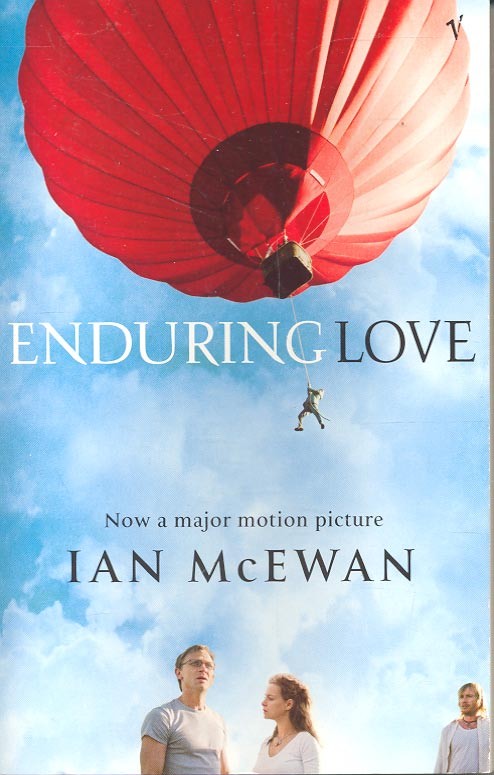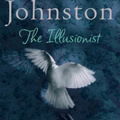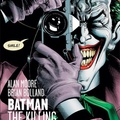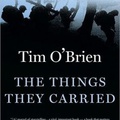Ian McEwan: Enduring Love

I love Ian McEwan. Amsterdam was the first of his novels I read, several years ago. I guess I could not really grasp its significance at the tender age of around 15, but I felt that it was good writing and since then I re-read it more than once. After Amsterdam, I put McEwan aside though, and only rediscovered him when I saw the movie version of Atonement about two years ago. Since then I have been keeping an eye on his work and my plan is to sooner of later read everything he has written.
The latest McEwan novel I chose was Enduring Love. It turned out to be a good choice, and so far it was the most human and most approachable of his novels I have read.
The opening scene of the novel is quite unique: a happily married couple, Joe and Clarissa are having a picnic somewhere in the lovely English countryside when suddenly a hot air balloon gets out of control and everybody nearby comes rushing to help the balloon owner. One of them, John Logan, meets his death in the attempt to help, and another person, the young, disturbed Jed Parry has a sudden crush on Joe and starts harassing him with his irrational love which is fuelled with religious fever.
After the surrealistic beginning, the human and emotional side of the story is quite easy to imagine and believe: after the accident, Joe tries hard to tackle his memories of the tragedy and also attempts to relieve himself of the sense of responsibility. Meanwhile, his everyday life and marriage are gradually overshadowed by Jed’s continuous presence: the young man keeps calling him, sends him love letters, blocks his way when he wants to leave his apartment, follows him around and finally even threatens his life. As a consequence, the so far harmonic relationship of Joe and Clarissa quickly begins to fall apart: at the beginning of his ordeal Joe does not tell Clarissa about Jed’s practices, and when finally he confides in his wife, it is too late – Clarissa already has her doubts and she concludes that actually it is not Jed but Joe who has something wrong with him.
The way McEwan presents the story is highly dramatic and intriguing: the novel is full of suspense and ominous foreshadowing, and these continuously made me feel that I had to read just one more chapter. One of the reviews quoted on the back cover of my copy says that counts as irresponsible behavior to start the novel in the evening if you plan to get any sleep that night. Well, this is a bit of an exaggeration: it is just possible to put down the novel, but it is certain that it will keep bugging somewhere in the back of your mind until you start reading again.
Another thing I liked immensely about the novel is the narrative technique it employs. This may be something of a perversion, but I am a huge sucker for novels with unusual narrative methods and/or stories which are told from the points of view of more than one narrator, and Enduring Love was a treat for me in this respect. Although the story is mostly told from Joe’s angle, there is a chapter in which Joe tries to enter Clarissa’s mind and recount the events the way she must experience them, and at some points the reader is also presented with some love letters Jed addresses to Joe, without any commentary whatsoever.
The narration is all the more interesting as Joe and Clarissa read the same events quite differently. Joe started out as a promising scientist, then turned into the successful author of popular scientific articles and books; Clarissa, on the other hand, is a prominent scholar, specializing in the life and poetry of John Keats – and their work and interests are reflected in the way they interpret the developments in their lives. Joe, true to his nature, tries to explain everything, collects facts and evidence, and finds out that Jed’s manic behavior is caused by a medical condition. At the same time Clarissa approaches Jed and his actions in an emotional way and is willing to get know him better, so that she might be able to understand his personality and motivations.
Still, Joe remains the main narrator and interpreter of the novel, and his rational approach seems to be confirmed by the appendix: it contains some medical opinions and case studies relating to Jed’s condition, and it also provides a very objective account of how Joe and Clarissa overcame the crisis caused by Jed. The content and tone of the appendix seems to correspond to Joe’s reading of the events, and this gives the impression that finally Joe has the last say in the story and that reason wins over feeling.
Finally I have to add some words about the Hungarian edition of the novel. I have no knowledge of the translation of the novel as a whole (though I have some ideas, knowing that it is the work of Dezső Tandori, a notoriously unreliable and over-creative translator). All I wish to reflect upon is the Hungarian title of the novel, which is “Insane/Crazy Love”. In my opinion, this title is a huge mistake as it simplifies the meaning of the original and it steers the reader towards one specific interpretation of the novel. In the novel, only the manic love of Jed towards Joe can be called a truly insane love. However, if we stick to Enduring Love, then the title invites more than one interpretation.
Naturally, Jed’s fanatic adoration is a specimen of enduring love, as we learn from the appendix that this type of love does not relent as time passes, and we can also read one of Jed’s letters, written three years after the main events, which displays the same intense emotions as those at the beginning of his “relationship” with Joe. Besides this, however, Joe’s and Clarissa’s love is also enduring, all the more so because it survives the crisis caused by Jed and perhaps it even grows stronger as a consequence. And the love between the minor characters John (the victim of the ballooning accident) and his widow, Jean is also enduring, as even though Jean believes that John cheated on her with one of his students, it finally turns out that John was faithful to her throughout their marriage and their love was never corrupted.
On the whole, Enduring Love was an exciting and rewarding read for me, and it made me want to read even more of McEwan’s books.





